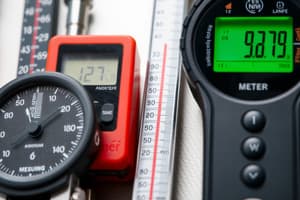Podcast
Questions and Answers
What is the main purpose of measuring matter in chemistry and science?
What is the main purpose of measuring matter in chemistry and science?
- To determine the color of substances
- To measure the texture of substances
- To identify the smell of different substances
- To understand the nature of matter and its interactions (correct)
Which tool would be most appropriate to measure the mass of a substance?
Which tool would be most appropriate to measure the mass of a substance?
- Graduated cylinders
- Rulers
- Balances (correct)
- Thermometers
What do graduated cylinders and beakers measure?
What do graduated cylinders and beakers measure?
- Volume of liquids (correct)
- Color intensity
- Temperature
- Mass of solids
Which tool is suitable for measuring the length of an object?
Which tool is suitable for measuring the length of an object?
What property do thermometers measure?
What property do thermometers measure?
What do mercury thermometers detect to measure temperature?
What do mercury thermometers detect to measure temperature?
Why is measuring matter important in scientific fields?
Why is measuring matter important in scientific fields?
What does the law of conservation of mass state?
What does the law of conservation of mass state?
How do bakers benefit from measuring ingredients?
How do bakers benefit from measuring ingredients?
Why do pharmacists measure doses of medication?
Why do pharmacists measure doses of medication?
Flashcards are hidden until you start studying
Study Notes
Measuring Matter
Measuring matter is an essential aspect of chemistry and science as a whole. It involves determining the physical properties of substances, such as mass, volume, or density, which can help us understand the nature of matter and how it interacts with other substances. In this article, we will explore the concept of measuring matter, discuss the tools and techniques used, and examine the role it plays in various scientific fields.
Tools and Techniques for Measuring Matter
Several tools and techniques exist to measure the properties of matter. Some of the most common methods include:
Balances and Scales
Balances and scales are used to measure the mass of a substance. They work by comparing the weight of the substance to be measured to the weight of a known reference mass. Balances can be digital or mechanical, and they can measure masses ranging from micrograms to kilograms.
Measuring Graduated Cylinders and Beakers
Graduated cylinders and beakers are used to measure the volume of liquids. They are calibrated to indicate the volume of liquid they contain at different levels. For example, a 100 mL beaker can hold 100 milliliters of liquid.
Rulers and Verniers
Rulers and verniers are used to measure the length or distance of an object. They can be used to measure the diameter of a circle, the length of a line, or the height of an object.
Thermometers
Therometers are used to measure temperature. They work by detecting the expansion or contraction of a substance in response to changes in temperature. For example, mercury thermometers measure temperature by detecting the rise and fall of mercury in a sealed glass tube.
Importance of Measuring Matter in Science
Measuring matter is essential in various scientific fields, including chemistry, physics, and biology. It helps scientists understand the properties and behavior of substances, predict their interactions, and develop new materials and technologies. For example, chemists use measurements to determine the composition of substances, identify unknown compounds, and develop new chemicals for various applications.
Conservation of Mass
The law of conservation of mass states that the total mass of a system remains constant before and after a chemical reaction. This principle is crucial in understanding the balance of matter in a system and how it changes during a reaction.
Measuring Matter in Everyday Life
Measuring matter is not just an academic exercise; it is also relevant in everyday life. For example, bakers measure ingredients to ensure consistent results in their recipes, and pharmacists measure doses of medication to ensure accurate treatment for patients.
Conclusion
Measuring matter is a fundamental aspect of science that helps us understand the properties and behavior of substances. By using tools and techniques like balances, thermometers, and graduated cylinders, we can accurately determine the mass, volume, and other properties of matter. This information is crucial for various scientific fields and has applications in everyday life. As scientists continue to explore the unknown and develop new technologies, the importance of measuring matter will only grow.
Studying That Suits You
Use AI to generate personalized quizzes and flashcards to suit your learning preferences.




